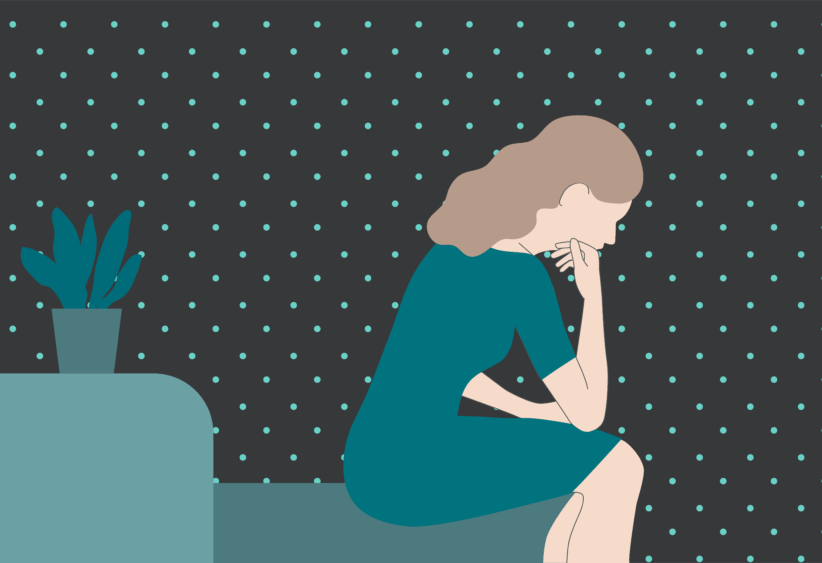 My daughter just turned two years old, and so for two years, I’ve been someone’s mom. Surreal, because it took so damn long to happen. For four years becoming a mom was all I thought about. I was so desperate to be one and I did everything I could to make it happen. I was a frequent flyer at the fertility doctor, received repeated acupuncture treatments, ate a gluten-free diet, and was on a constant roller coaster of hormones. The details of my journey with infertility may have been shocking (the shots! The pills! The ever-present bruises all over my body!), but the fact that I was on the journey was not. Before the constant negative pregnancy tests, the countless doctor’s appointments, and the realization that having sex with my husband wouldn’t yield a child, I had a prescient fear that I would never be a mom. It was a fear that felt more like a vision—something that was destined to happen — and I was always sure, more than I was ever sure about anything, that having kids would be very difficult for me. This fear was deeply rooted in the belief that my body would one day fail me when I needed it most.
My daughter just turned two years old, and so for two years, I’ve been someone’s mom. Surreal, because it took so damn long to happen. For four years becoming a mom was all I thought about. I was so desperate to be one and I did everything I could to make it happen. I was a frequent flyer at the fertility doctor, received repeated acupuncture treatments, ate a gluten-free diet, and was on a constant roller coaster of hormones. The details of my journey with infertility may have been shocking (the shots! The pills! The ever-present bruises all over my body!), but the fact that I was on the journey was not. Before the constant negative pregnancy tests, the countless doctor’s appointments, and the realization that having sex with my husband wouldn’t yield a child, I had a prescient fear that I would never be a mom. It was a fear that felt more like a vision—something that was destined to happen — and I was always sure, more than I was ever sure about anything, that having kids would be very difficult for me. This fear was deeply rooted in the belief that my body would one day fail me when I needed it most.
I don’t know how I was so certain of my infertility, but I can definitely guess why. The assumption that my body would fail me was only a short leap away from the fact that I was always ashamed of my body for one reason or another (as I think most women who came of age in the 90s are). Let’s think for a second about the way girls were taught to view their bodies when I was growing up. The “Body Positivity” movement sure as hell didn’t exist back then, and the term “self-love” was a double entendre for masturbation, not the wellness mantra it is today. When girls hit puberty, and the curves first appeared, they were made fun of by their classmates. When they got their periods, they were taught to hide the evidence, and worse, pretend it wasn’t happening. When their puppy fat didn’t fall off by the age it “should” have, they were introduced to dieting. And if eventually, too much weight came off, then they were told to eat a sandwich. The female form was only celebrated if it was beautiful, but society’s version of beauty was an impossible standard. Basically, if you were a girl in 1994 loving your body wasn’t even an option because you were too preoccupied with trying to change it all the time — and too ashamed of it.
Fast forward to 2015. I learned quickly that the shame associated with being a woman didn’t stop after puberty. It didn’t calm down in my 20s, nor did it subside in my 30s. When, at 31, my infertility was confirmed by our specialist I may not have been surprised, but I was devastated — and so ashamed. The vision I had came true. I felt like less of a woman, I felt it was my fault, and above all, I felt guilty that my husband was stuck with me. I was a lemon, a faulty model, with a body that couldn’t do the one thing it should have been programmed to do. The shame was so great that we didn’t breathe a word of it to anyone. For months we hid this huge part of our lives from our family and friends, and though it felt like torture, in my mind there was no other option. How could I tell people that I’ve failed as a woman? That we’ve failed as a couple? But I slowly found myself sharing my story with professional acquaintances, people I’d meet while filming TV segments or on set for a styling job. It somehow felt safer to confide in these strangers than telling anyone close to me what was going on.
An incredible thing happened with each new person I told: I felt better. It was like every time I told my story a little weight — and a little shame — would be lifted off of my shoulders, and I could breathe again. The other incredible thing that happened when I opened up was it seemed to make others open up too. It was like a chain reaction, from one woman to another, sharing in the shame together. I heard responses as simple as, “I went through IVF, too” or as complex as “It took me so many tries to have my son, but then I got pregnant naturally a year later.” I heard a lot of “My sister/cousin/friend went through it,” and some of “My partner and I have been trying for years.” And I even had one young woman tell me, “I’m actually an IVF baby myself.”
I came home one day and told my husband I was done keeping everyone in the dark. I was done acting like our infertility was a dirty little secret I had to hold close and tight. I wanted to let it go and I wanted the shame to go with it. That night we told our family and friends and I instantly felt liberated. I knew at that moment that these stories needed to be shouted from the rooftops, not just mine but all of them. Before I knew it I became obsessed with telling my story to anyone who would listen, and I tried to convince other women to tell theirs too. It dawned on me that sharing negates shame.
The problem with writing about infertility is that every single woman who has been through this journey has had a different experience. Much like pregnancy itself, the road of infertility is as unique as the woman (and couple) going through it. Every woman had her own hormone dosage, her own shots schedule, and her own statistics to overcome. Some women try for years and years with no child in the end. Some women try once and end up with twins. For some women, it’s not something they learn about themselves until it’s too late. For others, it’s something they know they will have to go through because of their individual circumstances, like health issues that would threaten a naturally-conceived child.
But I found comfort in each unique story, each unique experience. Thanks to every single woman who shared her struggle with me, I slowly managed to feel like less of a freak. Though I can’t say I completely love my body now (pregnancy and post-partum was a wild ride), I can say that I’m in awe of what it accomplished. I learned that my body is powerful, not perfect. It’s strong, not shameful. And when it comes to reproduction, I may be a lemon but at least I’m not the only one.
Psst…Want to know more about pregnancy during the coronavirus outbreak? Check out our post on Pregnancy and Coronavirus: Everything You Need to Know






















